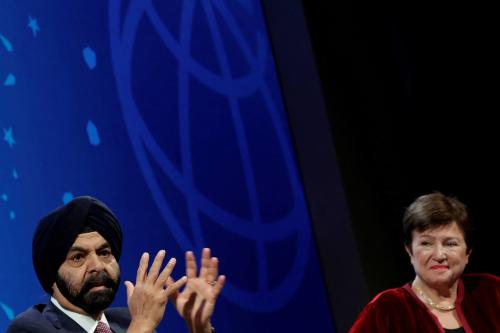Content from the Brookings Doha Center is now archived. In September 2021, after 14 years of impactful partnership, Brookings and the Brookings Doha Center announced that they were ending their affiliation. The Brookings Doha Center is now the Middle East Council on Global Affairs, a separate public policy institution based in Qatar.
It’s no secret that IMF reform has been slow since the jump-start it got at the Pittsburgh G-20 Summit last year, where after some arm-twisting President Obama managed to get a promise from his fellow leaders to reallocate “at least 5 percent” of the IMF’s voting rights to under-represented member countries, which are broadly understood to be emerging-market and developing economies.
The latest development on the reform front, as reported by Reuters, is that the U.S. will veto the approval of a special resolution at the next IMF Board of Governors meeting in October. This veto could have wide-ranging implications well beyond those of any recent quota review and bring about outcomes that we haven’t seen in a generation, albeit with significant risks.
The Issue
The resolution at stake would allow the main IMF policymaking body, its executive board, to operate at its current size (24 executive directors plus a chairman). However, the IMF charter only allows for 20 directors and straying from this provision requires approval by the board of governors of a special resolution every two years, with a supermajority of 85 percent of the overall voting power. This, in practice, puts the U.S. in the unique position to effectively exercise a veto given that its voting rights are 16.74 percent of the total.
The move to veto reflects three major concerns of the U.S. administration:
- The frustration at the slow progress in IMF governance reform, stalled mainly by underground European opposition.
- The White House objective to make emerging-market economies responsible stakeholders in the international monetary system with both rights and due accountability.
- The awareness that quota reallocations, though important, can exert limited impact on the IMF’s own decision-making if the issue of who sits in its boardroom is not addressed.
Fanning the flames of these long-time concerns was Europe’s stance at the June G-20 Summit in Toronto, when European leaders snubbed repeated U.S. calls for their countries to assume a fair share of the burden of sustaining the global recovery, as allowed, of course, by their respective macroeconomic conditions.
In fact, it is the Europeans that the U.S. is trying to target with the veto. For historical reasons, Europe has enjoyed the privilege of a sizable representation in the IMF’s most important hall. Depending on the rotational pattern of each chair, there are times when as many as eight European representatives sit on the executive board, 10 if we include representatives from Switzerland and Russia.
The Prospect
Any plan to consolidate European representation in the short-term is practically unworkable. Even if (and this is a big “if”) the Europeans were willing to pool their representation, this would inevitably mean drawing Germany, France and the U.K. into multi-country constituencies. The problem with that is these three countries are, by the stipulations of the IMF’s own charter, intended to occupy single chairs. Changing their status is feasible, but it would require amending the charter, which is not something that can be done overnight.
Because the U.S. move is mainly driven by their desire to shake things up, the impasse may be surmounted if at the October annual meetings the Europeans were willing to state—for the record—their pledge to pool their representation by the time of the next general elections in 2012, devise a binding roadmap and provide operational details as to how to achieve their target. Incidentally, this would have the benefit of reallocating country representation on the basis of revised quotas, as currently being negotiated, which would provide a stronger sense of legitimacy to the whole exercise.
There are a couple of solutions at hand. In the most recent consultations with global civil society, called for by the IMF’s managing director, a proposal was put forward in the final “Fourth Pillar” Report, and backed by several academics and civil society actors, to pool E.U. representation into two chairs: one representing euro area members, the other representing E.U. countries that do not belong to the European monetary union. This approach would leave enough room for a couple more chairs including other (non-E.U.) European countries, such as Switzerland, or rising economies, such as Turkey and some Eastern European nations. Alternatively and more realistically, euro area countries could cluster their representation around the three hubs of the largest euro-area economies (i.e. Germany, France and Italy) and then one or two more chairs would include other European countries.
But these options trigger other questions: if Germany and France end up in multi-country constituencies, the position of Saudi Arabia or Russia as single-country chairs becomes increasingly untenable.
The Risk
A “forced” consolidation of European representation through a U.S. veto is not without risk. The most immediate is the disruption of the ordinary governance of the institution. In a sense, this has already come to pass as general elections for executive directors, which should have been more or less finalized by now, have been put on hold. Should European governments fail to arrive at a constructive position on this issue, the IMF will be forced to extend the term of the current board due to expire on October 31. This would pose further legitimacy problems for an institution struggling to find a more representative and legitimate role in the changing world order.
Obviously, there is nothing to prevent the calling of a general election now. However, lacking any agreement among Europeans, then four board members will have to go. These will likely be those representing chairs with the lowest voting power, such as the twenty-three-member Rwandan, the six-member Argentinean, the four-member Indian and the nine-member Brazilian constituencies. As a result, important emerging-market countries and a dense group of low-income countries would lose their voice in the IMF’s policymaking room, which is exactly the opposite of what the U.S. has in mind by resorting to the veto.
The stakes are high any way you look at it. Though, European inaction could ratchet them up even further, putting in jeopardy the role of the IMF itself in the global community.



Commentary
Op-edAn Unexpected Agenda Item at the Next IMF Annual Meetings
September 7, 2010